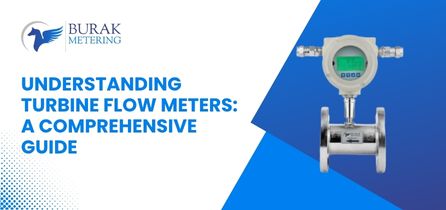 Phone
Phone

Flow measurement plays a critical role in maintaining the efficiency, accuracy, and safety of industrial systems, especially in applications involving power generation turbines, pipelines, or chemical processes. Among the various devices used to monitor fluid flow, the turbine flow meter is one of the most reliable and precise instruments. This meter is used to measure both liquid and gas flow rates across a wide range of industrial applications. In this comprehensive guide, we explore turbine flow measurement technology, including how it works, key components, advantages, limitations, and where it's most commonly used.
Turbine flow meters operate on the principle of mechanical rotation. A rotor, fitted with multiple blades, is mounted in the path of a flowing fluid. As the liquid or gas moves through the meter, it strikes the rotor blades, causing the rotor to spin. The rotational speed of the rotor is directly proportional to the velocity of the fluid—meaning, the faster the flow, the faster the turbine spins. This mechanism makes turbine flow meters particularly effective for applications requiring precise and responsive measurements.
The blades are usually made of stainless steel and are the only moving parts inside the housing. As the rotor turns, each blade passes a pickup sensor, which records the movement as an electrical pulse. Most sensors are magnetic, using the disturbance of a magnetic field to detect blade movement. These pulses are counted and converted into flow rate using a known constant called the K-Factor—a value that represents the number of pulses generated for each unit volume of fluid. This allows the meter to deliver accurate volumetric flowrate data, typically expressed in gallons per minute (GPM) or cubic meters per hour (m³/h).
A turbine flow meter includes several critical components:
Rotor blades that spin with fluid flow
Shaft and bearings to support the rotor
Pickup sensor to detect blade movement
Signal converter to translate pulses into readable data
Digital or analog display to show flow rate
Protective housing with proper inlet/outlet connections
In digital models, the system often includes communication protocols like Modbus or HART for integration with industrial control systems. A digital turbine flow meter also provides enhanced data logging, remote monitoring, and real-time alerts.
Accuracy depends on several factors: sensor sensitivity, fluid type, temperature, and pipeline conditions. Clean, low-viscosity fluids yield the best results. Straight pipe runs—typically 10 diameters upstream and 5 downstream—help reduce turbulence, which can impact readings. Proper calibration using the manufacturer’s K-Factor ensures reliable measurements. For gases, using a natural gas turbine flow meter or turbine gas meter built for the specific application is essential.
Turbine flow meters are not ideal for slurries, steam, or fluids with high particulate matter, as these can damage the rotor or skew results. They should also be installed away from valves or elbows to prevent distorted flow profiles.
Discover high-precision inline turbine flow meters for your industry.
Contact Burak Metering for turbine flow measurement solutions.
Turbine flow meters are widely used across industries:
Oil & Gas: For fuel, crude, and gas flow—especially using turbine gas meters
Water Management: Monitoring clean water supply and treatment
Power Generation: Measuring cooling water and exhaust gases in turbines
Chemical Industry: Dosing and fluid transfer with high precision
Pharmaceuticals and Food: Clean-in-place and process validation
Aerospace & Manufacturing: For fluids in testing, fuel systems, and quality control
High accuracy and repeatability for turbine flow measurement
Fast response time to flow changes
Compact and lightweight
Cost-effective compared to other precision flow meters
Digital turbine flow meters available for real-time monitoring
Wide flow range compatibility
Minimal pressure drop
Performance drops with dirty or viscous fluids
Requires regular calibration and maintenance
Not suitable for steam or bubbly fluids
May degrade in high-corrosion environments
Dependent on stable flow conditions and pipeline layout
When selecting a flow meter, consider:
Flow range and fluid type (liquid or gas)
Pipe size and installation space
Temperature and pressure conditions
Required accuracy and signal output
Need for communication protocols or remote access
Whether the application calls for an inline turbine flow meter, turbine gas meter, or digital turbine flow meter
Turbine flow meters remain a top choice for industries requiring accurate and responsive flow data. With proper installation and application, they deliver highly dependable performance across both gas and liquid systems. Whether you're working with water, chemicals, oil, or natural gas, turbine flow measurement can significantly enhance your process efficiency, control, and safety. By selecting the right model based on your specific requirements, you ensure long-term performance with minimal disruption.
Need a digital turbine flow meter or turbine gas meter?
Get expert advice from Burak Metering for accurate flow monitoring.